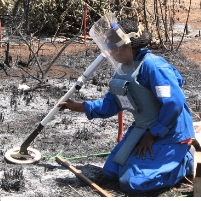Two-Thirds of Senate Ready to Ban Land Mines; But Not Obama
Tuesday, May 11, 2010
 Land Mine Clearance in Mozambique (photo: Mike Kendellen, International Campaign to Ban Landmines)
Land Mine Clearance in Mozambique (photo: Mike Kendellen, International Campaign to Ban Landmines)
The United States has the political votes to join an international treaty banning land mines—an agreement first pushed by Washington more than 15 years ago—leaving it up to President Barack Obama to join in the effort. Sixty eight senators, representing more than two-thirds of the Senate, signed a letter to Obama urging him to submit the treaty for ratification. The number of senators is more than what’s necessary to approve the agreement.
Although the Mine Ban Treaty was developed in part by the Clinton administration, the U.S. was not in a position to become a party to it before President Bill Clinton left office. Ratification was left up to President George W. Bush, who decided against joining the agreement.
The current push in Congress has been led by a bipartisan group consisting of Senators Patrick Leahy (D–Vermont) and George Voinovich (R–Ohio), and Representatives Jim McGovern (D–Massachusetts) and Darrell Issa (R–California).
A total of 158 nations have joined the 1997 Mine Ban Treaty, while 37 have not.
Joining the treaty would in some ways be a formality for the U.S., since it has not used antipersonnel mines since 1991, exported them since 1992, or produced them since 1997.
Nonetheless, there is no indication that President Obama will submit the treaty for ratification. On November 24, 2009, State Department spokesman Jim Kelly stated that, “we made our policy review and we determined that we would not be able to meet our national defense needs, nor our security commitments to our friends and allies if we sign this convention.”
-Noel Brinkerhoff
US: Two-Thirds in Senate Back Landmine Ban (Human Rights Watch)
- Top Stories
- Unusual News
- Where is the Money Going?
- Controversies
- U.S. and the World
- Appointments and Resignations
- Latest News
- Trump to Stop Deportations If…
- Trump Denounces World Series
- What If China Invaded the United States?
- Donald Trump Has a Mental Health Problem and It Has a Name
- Trump Goes on Renaming Frenzy






Comments